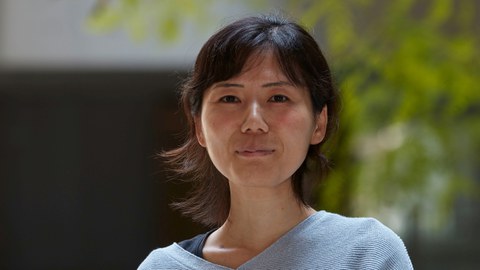Nov 29, 2022
Newly awarded Humboldt Professor Dr. Miki Ebisuya joins the Cluster of Excellence Physics of Life at TU Dresden
What sets the rates of biological clocks? Why does the duration of pregnancy differ between humans and mice? Dr. Miki Ebisuya has been fascinated by this fundamental question since childhood and has developed new ways to answer it as a scientist. Recently awarded an Alexander von Humboldt Professorship - Germany’s most highly endowed international research award - she plans to join the leadership at the Cluster of Excellence Physics of Life (PoL) in April 2023 on the newly established Chair of Cell and Tissue Control at TU Dresden’s Center for Molecular and Cellular Bioengineering.
A human pregnancy lasts roughly nine months whereas in a mouse it only takes 20 days and in an elephant a whole 22 months. During embryogenesis, the sequence and basic mechanisms of the developmental process are similar across species, but the speed of development differs substantially. The physical principles and molecular causes behind these differences in developmental timing are still unclear, not least because it is technically difficult to compare the embryos of several species. Numerous environmental factors, such as nutrients and body temperature, have to be normed before such a comparison can be made. Moreover, access to embryos of some species, including humans, is extraordinarily restricted and ethically controversial.
Miki Ebisuya found a new approach to tackle this problem. Her group recapitulated the developmental processes in vitro (in a test tube) by using pluripotent stem cells from several species. Pluripotent stem cells can develop into every type of cell in an organism and even build 3D structures, known as organoids, that imitate certain aspects of development of tissues and organs. Potentially, in vitro models of this kind can be created from many species which can then be compared under identical culture conditions. Miki Ebisuya has built a unique “stem cell zoo” with stem cells from many different species that now allows the very first systematic analysis of the developmental time of various species, including humans. This powerful approach provides new means study the biophysical and molecular differences that control biological time in different species.
At TU Dresden, interdisciplinary approaches to biological systems are taking a central stage. The new Cluster of Excellence Physics of Life is leading the efforts to bridge Physics and Biology. “Even when I was based in Japan, I knew about the Dresden community because of the many successful examples of collaborations between biologists and physicists. At the brand-new, exciting Cluster of Excellence PoL, I am hoping to promote this kind of interdisciplinary collaboration and reveal the biophysical basis of species-specific traits. At the same time, it will be great if my group can contribute to the institute and the community by disseminating the stem cell zoo platform and optogenetic manipulation tools we are developing.” says Dr. Ebisuya.
“It is a great achievement for TU Dresden to welcome another Humboldt Professor,” says Prof. Ursula Staudinger, Rector of TU Dresden. “It also shows the remarkable success of the Cluster of Excellence ‘Physics of Life,’ that has attracted outstanding international scientists during the last three years, including now the world’s leading scientist in synthetic biology”.
“With her strong expertise in synthetic and engineered multicellular systems as well as optogenetics, Miki Ebisuya complements perfectly the existing approaches at Physics of Life. The many synergies between her group and other PoL groups will lead to innovate approaches to understand the physical principles underlying biological self-organization. We are really excited to welcome her in Dresden” emphasizes Prof. Otger Campàs, managing director and speaker of PoL.
About Dr. Miki Ebisuya
Miki Ebisuya received the doctorate in her country of origin at Kyoto University in Japan in 2008 and subsequently became a research group leader there. Having completed a stint at the Japanese research institute RIKEN in Kyoto, she joined EMBL (European Molecular Biology Laboratory) at its newly-established site in Barcelona, Spain, as a group leader in 2018. She was granted the Japanese award for excellent junior female researchers in 2019 and an ERC Consolidator Grant in 2020. Miki Ebisuya has been endowed with the Humboldt Professorship for the next five years and plans to fill the Chair of Cell and Tissue Control at TU Dresden in April 2023.
About the Alexander von Humboldt Professorship
With a value of up to five million euros, the Alexander von Humboldt Professorship is the most highly-endowed research award in Germany. The Humboldt Professorship aims to attract leading-edge scientists from abroad to Germany. Humboldt Professorships are awarded for five year periods by the Alexander von Humboldt Foundation and financed by Germany's Federal Ministry of Education and Research. www.humboldt-foundation.de/en
About the Cluster of Excellence Physics of Life
Physics of Life (PoL) is one of three Clusters of Excellence at TU Dresden. It focuses on identifying the laws of physics that underlie the organization of life into molecules, cells and tissues. At the cluster, physicists, biologists and computer scientists join forces to investigate how active matter organizes itself into predetermined structures in cells and tissues, thus giving rise to life. PoL is funded by the DFG as part of the Excellence Strategy. It is a collaboration between scientists from TU Dresden and research institutions of the DRESDEN-concept network, such as the Max Planck Institute of Molecular Cell Biology and Genetics (MPI-CBG), the Max Planck Institute for the Physics of Complex Systems (MPI-PKS), the Leibniz Institute of Polymer Research (IPF) and the Helmholtz-Zentrum Dresden-Rossendorf (HZDR). www.physics-of-life.tu-dresden.de
Media inquiries:
Dr. Maria Begasse
COO Cluster of Excellence Physics of Life (PoL)

